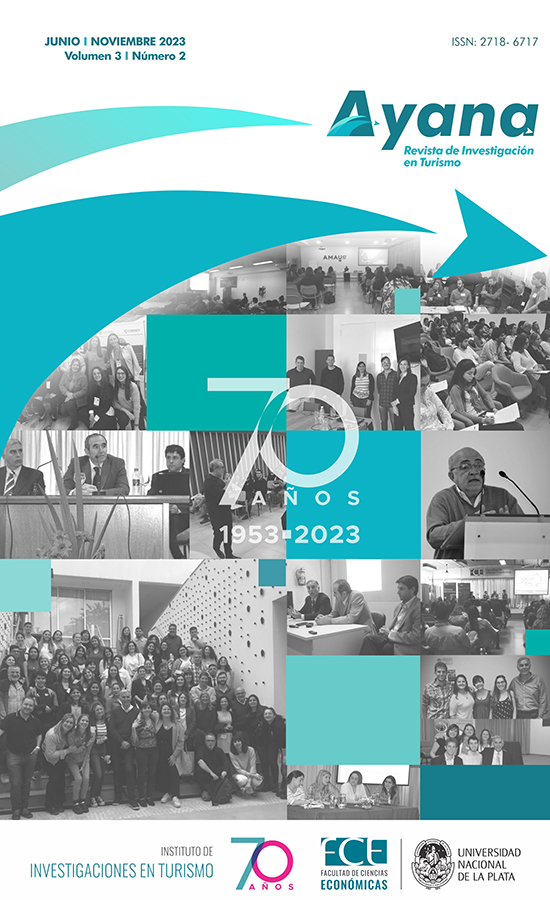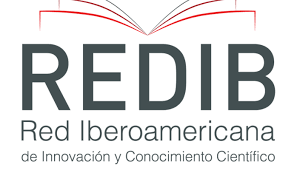Tensions between exclusion and inclusion in tourism development, an alternative perspective
DOI:
https://doi.org/10.24215/27186717e037Keywords:
development, exclusion, tourism policies, inclusive tourismAbstract
With the erosion of concepts such as "sustainable tourism" or "responsible tourism", designed to correct the most harmful aspects of this activity or aspired to improve the relationship between tourism and society, the category of inclusive tourism" takes relevance. This essay reconstructs the use of the term "inclusion" in tourism in the conceptualization of "inclusive growth", "inclusive development", and "inclusive tourism". These different uses of the concept, as well as the practical strategies in terms of policies they have inspired, are evaluated from an emancipatory perspective. Beyond the limits and potentialities of the idea of inclusive tourism is considered the opportunity to question and analyse tourism from the tension between exclusion and inclusion.
Downloads
References
Ashley, C., Boyd, C. y Goodwin, H. (2000). Pro-poor tourism: Putting poverty at the heart of the tourism agenda. Natural Resource Perspectives, 51.
Ashley, C. y Roe, D. (2002). Making tourism work for the poor: Strategies and challenges in Southern Africa. Development Southern Africa, 19(1), 61-82. https://doi.org/10.1080/03768350220123855
Bakker, M. (2018). A conceptual framework for identifying the binding constraints to tourism-driven inclusive growth. Tourism Planning and Development, 16(5), 575-590. https://doi.org/10.1080/21568316.2018.1541817
Bakker, M. y Messerli, H. R. (2017). Inclusive growth versus pro-poor growth: Implications for tourism development. Tourism and Hospitality Research, 17(4), 384-391. https://doi.org/10.1177/1467358416638919
Bhattacharya, T. (Ed.) (2017). Social reproduction theory. Remmaping class, recenttering oppression. Pluto Press.
Bianchi, R. y de Man, F. (2021). Tourism, inclusive growth and decent work: A political economy critique. Journal of Sustainable Tourism, 29(2-3), 353-371. https://doi.org/10.1080/09669582.2020.1730862
Biddulph, R. (2017). Social enterprise and inclusive tourism. Five cases in Siem Reap, Cambodia. Tourism Geographies, 20(4), 610-629. https://doi.org/10.1080/14616688.2017.1417471
Butler, G. y Rogerson, C. M. (2016). Inclusive local tourism development in South Africa: Evidence from Dullstroom. Local Economy, 31(1-2), 264-281. https://doi.org/10.1177/0269094215623732
Cañada, E. (2018). Dispossession, displacement and subordination in the construction of tourist areas: Central America as a conflict scenario. Norois, 247, 49-62. https://doi.org/10.4000/norois.6568
Cañada, E. (2020). Posibilidades y límites de un turismo inclusivo. Territorio, trabajo y comunidad en las geografías del turismo. Tesis doctoral. Universidad de las Islas Baleares. http://hdl.handle.net/11201/154348
Cañada, E. (2 de febrero de 2023). ¿Es posible un turismo poscapitalista? Alba Sud. https://www.albasud.org/noticia/1552/iquest-es-posible-un-turismo-poscapitalista
Cañada, E. y Murray, I. (2019). Turistificación global. Perspectivas críticas en turismo. Icaria Editorial.
Cicci, D. M. e Hidalgo, M. (2013). Turismo y alivio de la pobreza: fundamentos teóricos y evidencias empíricas. En J. Gascón, S. Morales, y J. Tresserras (Eds.), Cooperación en turismo: nuevos desafíos, nuevos debates (pp. 407-427). FTR; COODTUR; UOC; UB.
Cohen, E. (1988). Authenticity and commoditization in tourism. Annals of Tourism Research, 15(3), 371-386. https://doi.org/10.1016/0160-7383(88)90028-X
Denning, M. (2011). Vida sin salario. New Left Review, 66, 77-94.
Espinoza, M. (2003). Trabajo decente y protección social. Organización Internacional del Trabajo (OIT).
Fernández Álvarez, M. I. (2016). Experiencias de precariedad, creación de derechos y producción colectiva de bienestar(es) desde la economía popular. Revista Ensambles, 4 y 5, 72-89. https://ri.conicet.gov.ar/handle/11336/102868
Gascón, J. (2015). Pro-Poor tourism as a strategy to fight rural poverty: A critique. Journal of Agrarian Change, 15(4), 499-518. https://doi.org/10.1111/joac.12087
Gascón, J. (2017). Pro-Poor Tourism. En L. L. Lowry (Ed.), The SAGE international encyclopedia of travel and tourism (pp. 974–976). SAGE Publications, Inc.
Ghai, D. (2003). Trabajo decente. Concepto e indicadores. Revista Internacional del Trabajo, 122(2), 125-160. https://doi.org/10.1111/j.1564-913X.2003.tb00171.x
Goodwin, H. (2013). Turismo y reducción de la pobreza. En J. Gascón, S. Morales y J. Tresserras (Eds.), Cooperación en turismo: nuevos desafíos, nuevos debates (pp. 387-405). FTR; COODTUR; UOC; UB.
Hampton, M. P., Jeyacheya, J. y Long, P. H. (2018). Can Tourism Promote Inclusive Growth? Supply Chains, Ownership and Employment in Ha Long Bay, Vietnam. Journal of Development Studies, 54(2), 359-376. https://doi.org/10.1080/00220388.2017.1296572
Harrison, D. (2008). Pro-poor Tourism: A critique. Third World Quarterly, 29(5), 851-868. https://doi.org/10.1080/01436590802105983
Human Rights Watch (12 de febrero de 2014). “Aquí no hay investigaciones”. Impunidad de homicidios y otros abusos en el Bajo Aguán, Honduras. https://www.hrw.org/es/report/2014/02/12/aqui-no-hay-investigaciones/impunidad-de-homicidios-y-otros-abusos-en-el-bajo
López, A. e Izcara, C. (2023). Slum tourism. Controversias en torno al turismo y la pobreza. Alba Sud Editorial. https://www.albasud.org/publicacion/es/118/slum-tourism-controversias-en-torno-al-turismo-y-la-pobreza
López-González, J. L. (2018). Exploring discourse ethics for tourism transformation. Tourism, 66(3), 269-281.
Honduras: Violaciones de Derechos Humanos en el Bajo Aguán. Informe de la Misión de Verificación Internacional. (2011). Misión de Verificación Internacional.
Moreno, D. y Cole, S. (2019). No sustainability for tourism without gender equality. Journal of Sustainable Tourism, 27(7), 903-919. https://doi.org/10.1080/09669582.2019.1588283
Murray, I. (2012). Geografies del capitalisme balear: poder, metabolisme socioeconòmic i petjada ecològica d’una superpotència turística. Tesis doctoral inédita. Departament de Ciències de la Terra, Universitat de les Illes Balears. https://www.tdx.cat/handle/10803/104203
Navarro, V. (Ed.). (2007). Neoliberalism, Globalization, and Inequalities: Consequences for Health and Quality of Life. (1a ed.). Routledge.
Nyanjom, J., Boxall, K. y Slaven, J. (2018). Towards inclusive tourism? Stakeholder collaboration in the development of accessible tourism. Tourism Geographies, 20(4), 675-697. https://doi.org/10.1080/14616688.2018.1477828
Organización Internacional del Trabajo (1999). Trabajo decente. Memoria del Director General. 87.ª reunión de la Conferencia Internacional del Trabajo. Ginebra.
Pickett, D. y Wilkinson, R. (2009). The spirit level. Why More Equal Societies Almost Always Do Better. Allen Lane.
Rauniyar, G. y Kanbur, R. (2010). Inclusive growth and inclusive development: A review and synthesis of Asian Development Bank Literature. Journal of the Asia Pacific Economy, 15(4), 455-469. https://doi.org/10.1080/13547860.2010.517680
Scheyvens, R. y Biddulph, R. (2018). Inclusive tourism development. Tourism Geographies, 20(4), 589–609. https://doi.org/10.1080/14616688.2017.1381985
SNV y WBCSD (2010). Negocios inclusivos: creando valor en América Latina. SNV y WBCSD.
Stiglitz, J. (2012). The price of inequality. How today’s divided society endangers our future. W. W. Norton & Company.
World Bank (2004). World Bank/IMG Group urges increased efforts to reduce poverty. Development Committee says rich and poor countries should do more. World Bank.
Wright, E. O. (1994). Interrogating inequality. Essays on class analysis, socialism and Marxism. Verso.
Zapata Campos, M. J., Hall, C. M. y Backlund, S. (2018). Can MNCs promote more inclusive tourism? Apollo tour operator’s sustainability work. Tourism Geographies, 20(4), 630-652. https://doi.org/10.1080/14616688.2018.1457074
Downloads
Published
How to Cite
Issue
Section
License
Copyright (c) 2023 Ernest Cañada Mullor

This work is licensed under a Creative Commons Attribution-ShareAlike 4.0 International License.
Those authors who have publications with this journal, agree with the following terms:
a. Authors will retain its copyright and will ensure the rights of first publication of its work to the journal, which will be at the same time subject to the Creative Commons Atribución-NoComercial-SinDerivadas 4.0 Internacional (CC BY-NC-ND 4.0) allowing third parties to share the work as long as the author and the first publication on this journal is indicated.
b. Authors may elect other non-exclusive license agreements of the distribution of the published work (for example: locate it on an institutional telematics file or publish it on an monographic volume) as long as the first publication on this journal is indicated,
c. Authors are allowed and suggested to disseminate its work through the internet (for example: in institutional telematics files or in their website) before and during the submission process, which could produce interesting exchanges and increase the references of the published work. (see The effect of open Access)

























